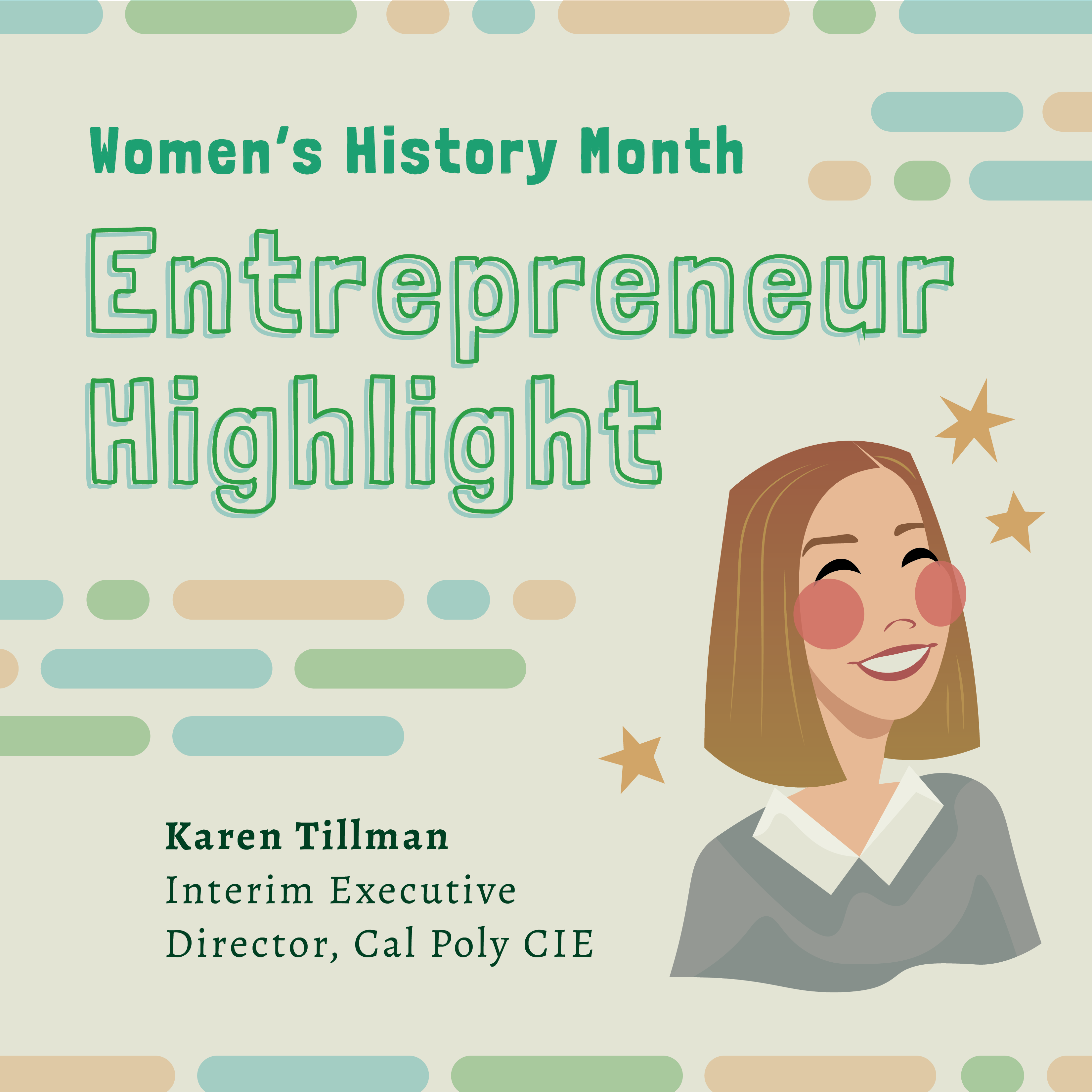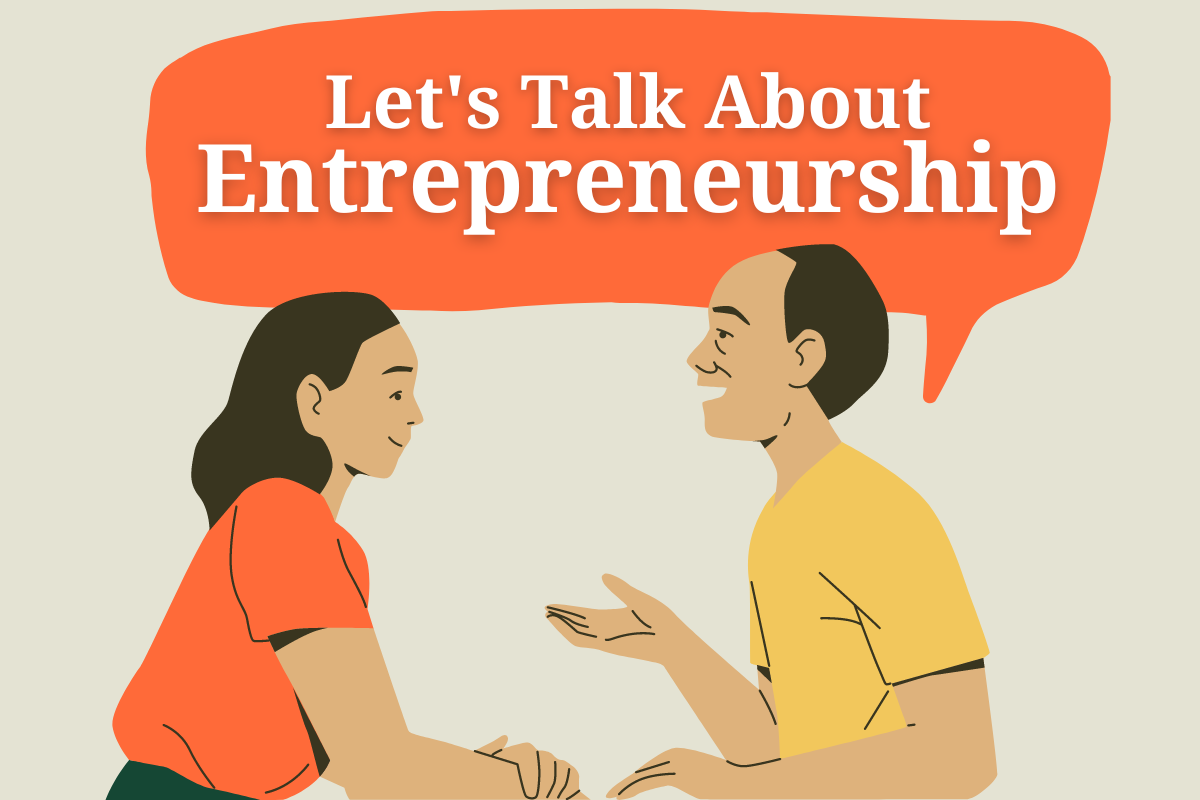Getting to know Karen Tillman

Meet Karen Tillman, the Cal Poly Center for Innovation and Entrepreneurship’s newest employee as the Interim Executive Director. Tillman formerly worked as Chief Communications Officer at Oracle, Cisco, GoDaddy and Brex and brings more than 25 years of experience from the tech world. Growing up in San Luis Obispo and traveling through work, Tillman has found her way back to her community.
Tillman recently sat down with us and discussed her passions and excitement for her new role:
Q: You’ve had some big roles: Vice President at Oracle, Chief Communications Officer at Cisco, Senior Vice President at GoDaddy, and Chief Communications Officer at Brex. So, what intrigued you about working within Higher Education and why did you choose San Luis Obispo?
In my tech career, I traveled a ton and I lived in the Bay Area for a little. But, for the most part, I’ve always lived in San Luis Obispo. The reason I wanted to change to this role specifically and work in higher education was that even though I worked on some amazing projects, I always felt pretty disconnected from where I lived. I’m pretty extroverted — when I go downtown, I love running into everyone I know. But, I wanted to understand what it felt like to work and live in the same community. I hope that some of my previous experiences will help shape the work that I do here on behalf of the University and local region. I always knew that I wanted to work at Cal Poly and I sort of rattled through the years’ different iterations of what that could look like. But this ended up being such a great fit.
Cal Poly has such an awesome community, the institution is so impressive. What the CIE is doing has to be one of the best in the U.S. and I think that the best days of the CIE are ahead of us!
Q: What is something that has surprised you about working in higher education?
This wasn’t necessarily surprising, but when you actually experience it, it’s pretty amazing, which is the depth of knowledge in different areas at Cal Poly. I’ve sat in on some talks around campus, attended classes on various topics, and learned about so many different things — it’s totally mind-blowing. Every time I go to a talk, I always come out thinking: why didn’t I major in that, why didn’t I major in Social Science? It’s so eye-opening, the schools of study are so immense and fascinating. Where people specialize – how they do it and how people find their niche also fascinates me – I just love that part of the process.
Q: What does the future look like for economic development in San Luis Obispo?
The University has had pockets of economic development for years and some really cool projects. When President Armstrong made my role a position out of his office, it was because he saw there was so much opportunity in our region right now. For instance, the Morro Bay wind area and the three wind developers that are looking to build the first deepwater offshore wind installation in the US. We need to think, how do we as a community come together to not only shape these opportunities in alignment with our regional goals and values but also drive economic growth? We always have to think about how we can keep our community vibrant, innovative and alive. A lot of that comes from economic development. So, when you think about projects even in other spaces like Space Commercialization, Precision Manufacturing and Ag Tech, these are huge opportunities that could create massive jobs in our region which is also a huge opportunity for Cal Poly.
In some respects, it’s an embarrassment of riches and I don’t know which amazing opportunity to focus on first because there are so many that have so much benefit for us! This is a very rich area to develop and over time it will become clear what paths are going to be the most beneficial.
Q: Describe your perfect day.
My husband and I wake up at five every day, by design. We love it because we sit and have coffee for an hour and stare out the window at Madonna Mountain. Then, I would go take my dog Frida out to run — we usually go to Madonna Mountain or Poly Canyon. Then, I would come back and have brunch somewhere yummy. After that, I would take a nap — a perfect day would have a nap. Then, in the afternoon, I would go up to our horse ranch in Creston and take my horse and maybe another horse out on a ride. Then, I would sit out with some friends, have wine in the backyard and look at the sun going down in Creston. That would really be a perfect day.
Q: What do you admire most in other people?
Authenticity. I don’t know how you have a real relationship with somebody who isn’t authentic to who they are. I’m not interested in someone’s status. People who are completely themselves are fascinating and I love learning about who they are, what motivates them, what they love and what they don’t love. So, I think authenticity and vulnerability — vulnerability is kind of necessary to be authentic — are the things I deeply admire and am attracted to. I enjoy it when things don’t feel produced or forced.
Q: What is something that you are passionate about and why?
That’s part of my problem, I tend to swing back and forth between a few different passions. My family is an obvious one, I have a 19-year-old daughter at the University of Oregon. We have that kind of relationship where we just click and I cannot say how much I have loved being her mom. It’s been the best thing I’ve ever experienced.
I’m also extraordinarily passionate about anything outdoors. I work with a nonprofit horse rescue that rescues Mustangs, so that’s probably where I spend the vast majority of my concentrated time. Our ranch has over 20 rescues right now and we adopt them, train them, then adopt them out to other homes. It’s pretty heartbreaking what we do to wild horses and so wild horse advocacy is something that I’m super interested in.
I’m also really interested in women in technology issues, women’s rights issues and social activism.
Q: What is a movie you could watch every day and why?
Pride and Prejudice. If I wake up too early and I can’t go back to sleep, I watch Pride and Prejudice. I was a literature major in college and I love the story. I love the way it budges around social classes and the role of women. It’s an extraordinarily progressive concept, especially for when it was written so I love that.
Q: If you started a business, what would it be?
I used to want to run a cheese shop. I love understanding what people are doing and how they are looking for cheese to be in their life. Then, I like matching them with the right cheese. In fact, at some point, I registered a domain called The Cheese Algorithm, which was basically matching somebody to cheese.
The other thing I started at GoDaddy was a reverse mentorship program. I was blown away by how beneficial it was for people earlier in their careers to mentor more senior people. I always thought that would be just an amazing nonprofit to start in some capacity.
Q: What makes you passionate about entrepreneurship?
Entrepreneurship defies logic in so many ways. I do not have an entrepreneur’s brain myself — I think I have an innovator’s brain but not an entrepreneur’s. The bravery and courage it takes to become an entrepreneur, it astounds me. I have an insane respect for those who are willing to walk that path because it’s not an easy one and it takes a special human.
Spending almost three decades in Silicon Valley and seeing the actual impact and results of those who are brave enough to walk that path is amazing. When I started at Oracle, it had 40,000 employees and when I left Oracle, it had 120,000 employees. Cisco had 75,000 employees when I Ieft. You don’t know how people will do it but they make it work and end up employing hundreds of people around the world and powering governments, cities and corporations. It’s just mind-boggling what entrepreneurship and technology can do.
I have never lost my passion for the transformational power of technology. I think the pure nature of what many people try to do through entrepreneurship and in technology specifically is a marvel.
